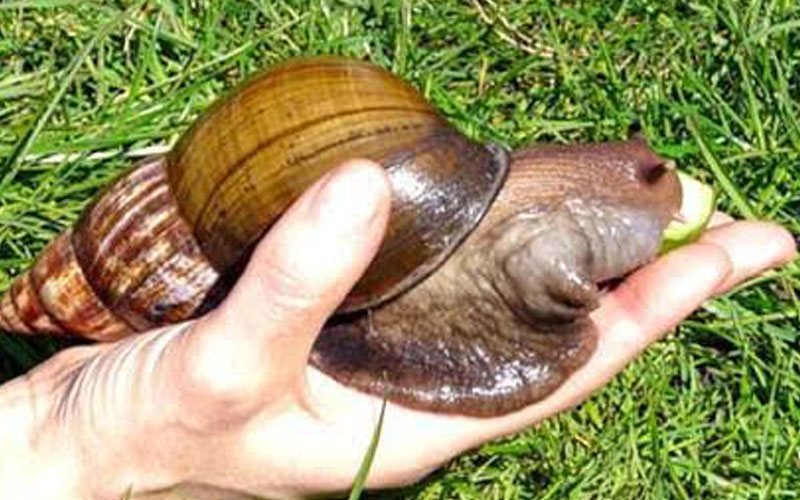Using snails to make organic fertilisers – and money

While studying for his PhD in Vienna, Austria, Dr Paul Kinoti was inspired by snail farming.
Now a lecturer at the Department of Horticulture and Food Security at Jomo Kenyatta University of Agriculture and Technology (JKUAT), Kinoti stayed with a farmer who made growing snails seem like an easy venture. This is where Dr Kinoti learnt all he needed to know about snails.
“There is much value from snails (konokono in Kiswahili or gastropoda in science) cutting sectors such as food security, cosmetics, pharmaceuticals, animal feed and fertiliser-making.
Besides, snail farming requires less capital to start but offers high returns compared to other conventional farming systems,” he explains
Excited by a venture which he thought could create employment opportunities for desperate Kenyan youth, Dr Kinoti came back to home in 2014 and researched on how to establish and encourage Kenyans to embrace snail farming as an income-generating enterprise.
“It took time to plan and secure funding to research on value addition on snail products. It was not until early last year when my projectcommenced. Many people could not understand what was so special in snails (a disgusting animal to touch) to motivate them into snail farming.
I had to try and overcome cultural and religious obstacles to manage and convince our people on the significance of embracing snail farming both as source of food, health, beauty and as income earner,” says Kinoti
Some communities associate snails with outdated beliefs such as witchcraft. Many other Kenyans cannot imagine feeding on snails as a delicacy. As for religion, most Muslims do not associate themselves with snails.
Despite the challenges, Kinoti embarked on the study on bio snail shell fortified compost as an organic fertiliser last year at Ngong Farmers Training Centre (Ngong FTC).

The idea came about after research showed snail shells are rich in calcium and iron —major limiting factors in crop production.
“The global trend is organic farming for better health as result of many lifestyle diseases such as diabetes and cancer which could be addressed through organic farming.
Besides, we wanted to find out how we could utilise snail shells as alternative, cheaper and more efficient organic fertiliser,” says Kinoti.
According to the research, the use of bio snail shell fortified compost in combination with inorganic fertiliser yielded much more tomatoes compared to individual inorganic fertiliser or ordinary compost.
Although higher yields were noted in a combination between the two, individually much higher yield was reported in bio snail shell fortified compost compared to the individual inorganic fertiliser or ordinary compost.
This means if maximum yield is the objective, a combination would boost yields but better plant performance was observed using the bio snail fortified compost.
Since the fertiliser is made from locally available agricultural or horticulture waste products as major ingredients, then the cost of such fertiliser would be lower.
Moreover, since snail products are organic, there is no need to worry of the dangers associated with agrochemicals, hence higher market value both local and export is expected hence higher income.
Consequently, this leads to a better soil improvement, which leads to a better plant performance.
Other uses of snails
Until recently, snails were considered a traditional Mediterranean dish. An average snail comprises 80 per cent water, 15 per cent protein and 2.4 per cent fat. Consumption of snails is considered to be highly beneficial for the human health due to the Ω-3 (Omega three) fatty acids they contain.
They are also assumed to inhibit atherosclerosis (a disease in which plaque builds up inside your arteries and thrombosis (formation of a blood clot, known as a thrombus, within a blood vessel).
“They also contain essential fatty acids, calcium, iron, selenium, magnesium and are a rich source of vitamins E, A, K and B12. In addition, snail meat has anti-inflammatory effects, aids to the prevention of allergies, depression and other diseases of the nervous system,” explains Dr Kinoti.
Nowadays, the popularity of snails in pharmaceuticals and cosmetics is growing rapidly. Snail slime (or snail filtrate) is packed with nutrients such as hyaluronic acid, allantoin, antibiotics, glycolic acid, collagen and elastin, all commonly used in beauty products and proven to be beneficial for the skin.
An average snail also contains a glycoprotein, believed to contain cancer-fighting properties. Indeed, recent research suggests that people in Crete tend to be healthier and indicate lower rates of cancer due to their frequent consumption of snails.
Indeed most commonly extracted slime has shown an average SPF (Sun Protection Factor of 30.2), and could be used as a sunscreen by young children and persons with albinism.
“We are working to see how effective the snail slime could be used as a cough syrup and stomach ulcers treatment,” says Dr Kinoti.










